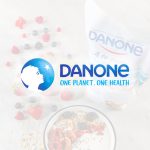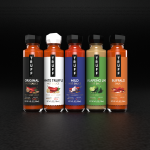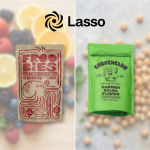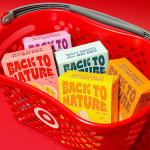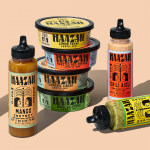The Checkout: FDA Launches ‘Closer to Zero’ Baby Food Action Plan; Impossible Foods Debuts First National Ad Campaign
Welcome to The Checkout: an express lane for weekly news you need to know, always 10 items or less.
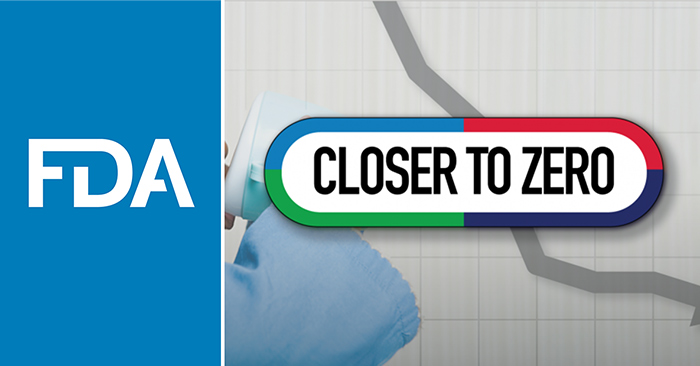
FDA Announces ‘Closer to Zero’ Action Plan for Baby Food
The U.S. Food and Drug Administration (FDA) yesterday announced a new action plan called “Closer to Zero” which aims to reduce babies’ and young children’s exposure to toxic elements in foods. The FDA said in a press release that its goal with the multi-phased action plan is to reduce the levels of arsenic, lead, cadmium and mercury in foods “to the greatest extent possible,” while still being feasible for food producers.
“Closer to Zero” has four stages. The first stage involves evaluating the relevant scientific information to establish interim reference levels (IRLs), a measure of exposure from food that the FDA “may use to determine if the amount of exposure to an individual element across foods could result in a specific health impact.” IRLs will be determined through engagement with stakeholders, advisory committees and scientific experts.
Next, the FDA will propose action levels for certain toxic elements, informed by the IRLs, in popular children’s food categories like cereals, infant formula and pureed fruits and vegetables. The FDA will then consult with stakeholders on these proposed action levels for each element in every identified food category, determining the “achievability and feasibility” of the levels and proposing a timeframe for meeting them. Finally, the FDA will finalize the action levels.
During the first year of the plan (Phase One), the FDA will focus on evaluating arsenic and proposing action levels for lead due to the availability of data surrounding these elements, and will then cycle through the four-pronged approach for cadmium and mercury in the following years.
The FDA’s action plan comes after a congressional report released in February revealed that significant levels of toxic heavy metals including arsenic, lead, cadmium and mercury were found in baby food products made by Hain Celestial, Nurture, Beech-Nut and Gerber. As a result of this investigation, U.S. lawmakers last month introduced the Baby Food Safety Act of 2021, which would limit the amount of heavy metals in baby food, in the House of Representatives and Senate. This bill would require manufacturers’ compliance with its proposed action levels of arsenic, cadmium, lead and mercury within a year of the law’s enactment, while the FDA has introduced a multi-year approach.
Despite the roll out of the Closer to Zero plan, the FDA noted in a press release that its testing indicates that “children are not at an immediate health risk from exposure to toxic elements at the levels found in foods.”
“However, we know that additional progress can be made and are confident that a science-driven, transparent and inclusive process will help lead to even further reductions in exposure to these toxic elements,” the FDA said.
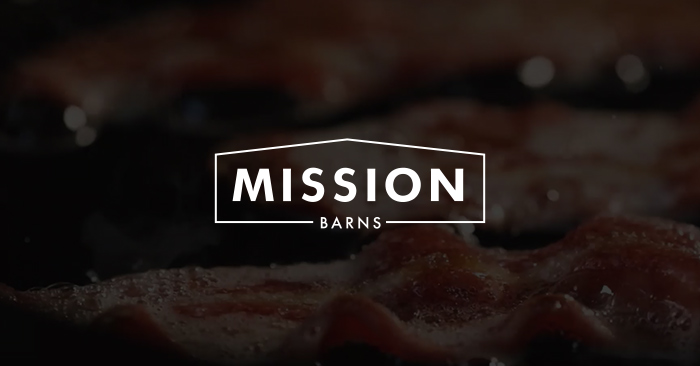
Cultivated Animal Fat Company Mission Barns Raises $24 Million
San Francisco-based cellular agriculture company Mission Barns this week announced it had secured $24 million in funding to scale and commercialize its cultivated fat technology and construct a Bay Area pilot manufacturing plant.
Participants in the funding round include Lever VC and Gullspang Re:Food, as well as several investors with close ties to the plant-based meat and dairy industry, including Green Monday Ventures (an investor in Beyond Meat) and Enfini Ventures (a backer of Impossible Foods and Memphis Meat), along with an unnamed European meat company. Several seed investors such as Global Founders Capital and Point Nine Capital also increased their stake in the company.
Founded in 2018, Mission Barns cultivates animal fat it calls Mission Fat from pork, poultry and beef cells by “feeding” them a plant-based feedstock inside a cultivator. The product, which emits less carbon and requires less water and land than animal agriculture, can be used in plant-based meat to improve flavor and mouthfeel.
The company has developed products using this fat on its own and through collaborations with meat and plant protein companies, with potential applications including bacon, burgers, nuggets, hot dogs, poultry sausages and meatballs, according to the company. Lever VC managing partner Nick Cooney called Mission Fat a “game-changer for the alternative meat sector.”
“It’s going to help brands around the world have a dramatically better product almost overnight,” he said.
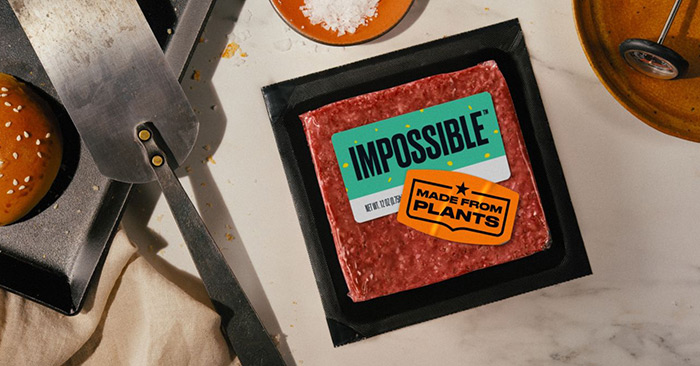
Impossible Foods Launches First National Ad Campaign
Plant-based meat maker Impossible Foods this week debuted its first mass-market advertising campaign, “We Are Meat,” aimed at building awareness for the company’s Impossible Burger through television, digital and social.
After finding that nine out of 10 of Impossible Foods customers are also meat eaters, the campaign, which includes five TV spots, is designed to appeal to meat eaters who haven’t yet tried the company’s products. One ad, “We Love Meat,” depicts Impossible Burgers sizzling on a grill, with the narrator referring to the product as “Impossible meat, made from plants.” Another ad entitled “Yes We Do” alludes to the environmental impact of ground beef from cows.
“Consumers are skeptical based on years of sub-par experiences with conventional, plant-based products,” Impossible Foods’ senior vice president of marketing Jessie Becker said in a press release. “We built this campaign to introduce Impossible products to consumers nationwide as delicious meat — no qualifications or compromises needed.”
The company said in a press release this week that as of last month, 82 cents of every $1 spent on the Impossible Burger “came at the direct expense of animal-derived products,” establishing a “displacement rate” of 82%. The company also said it has driven trial through three rounds of retail price cuts throughout the U.S. over the past year. CEO and founder Dr. Patrick O. Brown added that if Impossible is able to continue on this trajectory, it could undercut the price of commodity ground beef within the next few years.
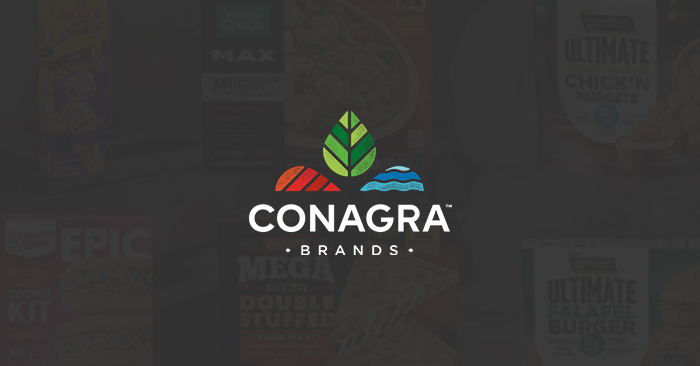
Conagra Reports Fiscal Q3 Results
Conagra Brands yesterday reported its third quarter results for the fiscal year 2021, which reflected retail sales growth across several segments as consumers continue at-home eating habits.
The company saw net sales increase 8.5% in the quarter, with a 9.7% increase in organic net sales and 1.2% decline related to the the divestitures of its Peter Pan peanut butter business to Post Holdings, completed earlier this year, as well as the sales of the H.K Anderson pretzel nugget business to Utz and Lender’s bagel business to Grupo Bimbo last year.
The net sales increase was driven by success in the retail channel, with continued at-home food consumption driven by the pandemic, the company said. Its Grocery & Snacks segment saw a 10.8% increase, to $1.1 billion, while net sales of its Refrigerated & Frozen segment grew 11.7%, to $1.2 billion. New innovations including recent launches from Bird’s Eye, such as Buffalo Style Cauliflower Wings, contributed to this sales growth. However, the company’s foodservice segment decreased 17.2%, driven by low restaurant traffic.
Throughout the third quarter, the company supported its brands’ growth in both retail and ecommerce and digital marketing, CEO Sean Connolly said, with 76% of its brands growing share in ecommerce over the last year.
Looking ahead, Connelly said the company anticipates that consumers will maintain shopping habits adopted over the past year beyond the pandemic. He referenced a similar shift to at-home eating established during the 2008 recession, which lasted far beyond economic recovery because it was “driven by the formation of new habits,” he said.
“While we are poised to benefit from sustained elevated at-home eating, we are not resting on our laurels or taking our consumers for granted,” he said. “We are continuing to invest behind our brands to create connections with consumers.”

